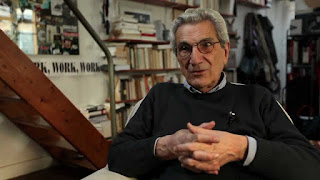Maybe that should be, “Why would I spend a week talking about a bunch of weird philosophers from the late 19th and early 20th centuries?” Because that’s kind of what I did. I tried to make the ideas pretty accessible, though you do need at least a high school reading level to follow my blog.
I don't think that’s unreasonable, given what I’m talking about.
 |
| The greatest books contain whole libraries of thinking. |
Ideas and concepts are always going to sound weird when you write or talk about them. And it can be fucking hard to wrap your head around some of this stuff. I think it’s valuable, if nothing else, as an exercise for your brain.
But I also think working your way through weird, complex concepts and using them to understand your world does make you sharper. It can improve the depth of your understanding of the world. It lets you see more of the world than you used to.
Philosophical thinking helps you cut through the bullshit.
When I write philosophically, whether it’s on the blog or in my larger published projects, part of what I always try to do is cut through bullshit. In Ecology, Ethics, and the Future of Humanity, part of what I did was cut away a lot of the extraneous interpretations and academic riffs on Gilles Deleuze and Félix Guattari.
They were the biggest single inspirations on that project. But university academics had written so much interpretation and argument over whose understanding of Deleuze and Guattari’s works was the “true” one. It was a doctoral thesis, so I had to acknowledge that I read it.
But the furiously published secondary material of academia, the interpretations piled on interpretations, honestly gets in the way of thinking. Instead of understanding the book on its own terms and your own as a reader, you build some overcomplicated picture of influences and definitions.
Those academic battles are especially ironic in Deleuze’s case. He correctly identified that the books that have the greatest legacies are the ones whose interpretation and application to changing times can never stop.
Books whose single, simple meanings are univocally clear from the start are quickly forgotten. They lose relevance as the world changes. That’s not to say that great books are incomprehensible.
Great books are multiply comprehensible, creatively applicable, infinitely unfoldable.
I had a simple starting concept for Ecology, Ethics, and the Future of Humanity. What is ecological thinking? Look around for a solid model that appealed for its flexibility, breadth, and depth. Well, a lot of the stuff in A Thousand Plateaus works well. Let’s dive in, see what we can find, run like mad with it, and build a book.
I don’t think this is how much academics would work. But it builds better books. At least, it builds more interesting books.
So why did I spend the last week talking about these thinkers? Just because Antonio Negri listed them in a cursory comment about visionary writers of the end of modernity?
Because I’ve read or come to know of these writers, and they all write precisely with that theme, and with a very remarkable power. Nietzsche, Schmitt, Weber, Husserl, Heidegger, Rosenzweig, Benjamin. All legends in their own right.
When I write Utopias, it’ll be in a different style again from Ecology, Ethics, and the Future of Humanity. My already-published book grounds itself in the academic tradition, familiarizing itself with many disciplinary fields of research and inserting as many into the text itself to prove that I'd done the requisite research.
Utopias will put the concepts at the foreground. Each sentence will be one step forward in a long conceptual construction and exploration. One element of a long argument about why we desire the perfect democratic society, and how our conceptions of past, present, and future condition how we engage with that desire.
So my research sources won’t be sources to cite. Largely, I’ll be working only with primary sources in philosophy: the tradition itself, standing on the shoulders of our giants.
The ideas they discuss and create will shape the questions that focus each of those arguments. So when I get to my argument about the social impact of the First World War as the undeniable breaking of the West’s dream of inevitable progress, the ideas of Nietzsche, Schmitt, Weber, Husserl, Heidegger, Rosenzweig, Benjamin, and Ernst Jünger will illustrate and illuminate some aspect of that social collapse.
Utopias will be a very trippy book.

No comments:
Post a Comment